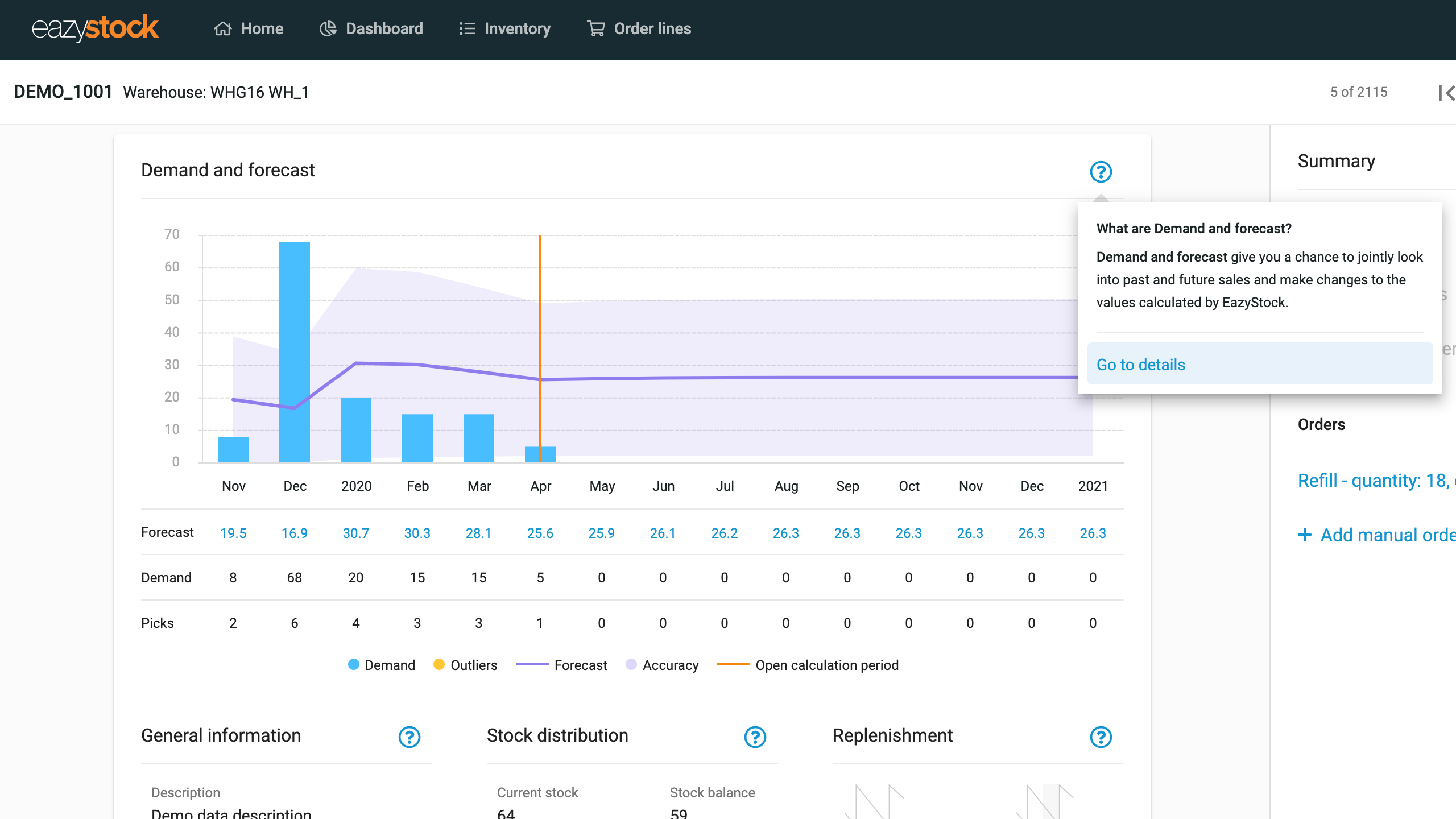
EazyStock: Complete Buyer's Guide
AI-powered inventory optimization that transforms manual replenishment into automated, data-driven decisions for growing ecommerce businesses.
EazyStock is a specialized AI-driven inventory optimization platform designed specifically for small-to-midsized ecommerce retailers managing complex multi-channel operations.
Market Position & Maturity
Market Standing
EazyStock occupies a strategic position in the inventory management software market, targeting the underserved middle market between enterprise solutions and basic entry-level tools.
Company Maturity
EazyStock demonstrates business maturity through its structured implementation methodology, dedicated customer success management, and comprehensive support infrastructure.
Growth Trajectory
Customer evidence suggests strong market traction, with implementations spanning multiple industries and company sizes. The platform's ability to deliver measurable ROI within 1.5-12 months supports sustainable growth potential, though specific revenue or customer growth metrics are not publicly disclosed[43][50].
Industry Recognition
While specific awards or analyst recognition are not documented in available research, customer case studies like Ergofast provide third-party validation of the platform's effectiveness. The documented 35% reduction in excess inventory and 12% service-level improvements represent concrete proof of capabilities[40][47][48].
Strategic Partnerships
EazyStock's extensive ERP integration capabilities suggest established partnerships with major business software providers, though specific partnership details are not disclosed in available research.
Proof of Capabilities
Customer Evidence
Ergofast, a logistics and ergonomic solutions company, achieved significant measurable improvements through EazyStock implementation. Maria Candetoft, Purchase & Logistics Manager, reported 12% service-level improvements and 35% reduction in excess inventory within six months of deployment[40][47][48].
Quantified Outcomes
Customer implementations demonstrate consistent performance patterns across multiple metrics. Organizations report planning time reductions of 30% through automated exception management and demand outlier alerts[43][50]. The platform enables 70-80% automation of manual replenishment tasks, significantly reducing labor requirements while improving accuracy[40][44].
Case Study Analysis
The Ergofast implementation provides detailed insight into EazyStock's deployment methodology and outcome potential. The 22% inventory reduction achieved within six months demonstrates the platform's ability to optimize working capital while maintaining service levels[40][47][48].
Market Validation
Customer adoption spans multiple sectors, with documented success in wholesale, distribution, and retail environments. The platform performs particularly well for seasonal businesses, achieving 20-35% reductions in post-event dead stock through dynamic safety stock adjustments[42][48].
Competitive Wins
EazyStock's live simulation capabilities provide competitive advantages over alternatives like Prediko and Zoho, enabling risk-free scenario testing before implementation[43][50].
AI Technology
EazyStock's technological foundation centers on proprietary AI-powered forecasting algorithms that analyze demand patterns, seasonality, and supplier variables to dynamically adjust reorder points and safety stock levels[46].
Architecture
EazyStock's architecture prioritizes ERP-agnostic integration, offering pre-built connectors for NetSuite, Microsoft Dynamics, and 15+ other systems without middleware requirements[45][49].
Primary Competitors
EazyStock competes against enterprise solutions like Oracle and RELEX for sophisticated inventory optimization, while differentiating from entry-level alternatives like Zoho and Prediko through advanced AI capabilities and comprehensive integration support[41][49][54].
Competitive Advantages
EazyStock's primary differentiator lies in its ERP-agnostic integration capabilities, offering pre-built connectors for 15+ systems without middleware requirements[45][49]. The platform's live simulation tools represent a significant competitive advantage, allowing risk-free scenario testing before implementation—a feature absent in competitors like Prediko and Zoho[43][50].
Market Positioning
EazyStock's positioning targets the underserved middle market between enterprise complexity and basic functionality. The platform's specialized ecommerce focus and accessible implementation approach appeal to growing retailers who need sophisticated optimization without enterprise-level resource requirements[41][49].
Win/Loss Scenarios
EazyStock wins against competitors when organizations require ERP integration without middleware complexity, specialized ecommerce inventory optimization, and dedicated customer success support for mid-market deployments[41][45][49]. The platform loses to enterprise solutions for global scalability requirements and to native platform solutions for single-channel optimization needs.
Key Features

Pros & Cons
Use Cases
Integrations
Featured In Articles
Comprehensive analysis of Inventory Replenishment for Ecommerce for Ecommerce businesses and online retailers. Expert evaluation of features, pricing, and implementation.
How We Researched This Guide
About This Guide: This comprehensive analysis is based on extensive competitive intelligence and real-world implementation data from leading AI vendors. StayModern updates this guide quarterly to reflect market developments and vendor performance changes.
54+ verified sources per analysis including official documentation, customer reviews, analyst reports, and industry publications.
- • Vendor documentation & whitepapers
- • Customer testimonials & case studies
- • Third-party analyst assessments
- • Industry benchmarking reports
Standardized assessment framework across 8 key dimensions for objective comparison.
- • Technology capabilities & architecture
- • Market position & customer evidence
- • Implementation experience & support
- • Pricing value & competitive position
Research is refreshed every 90 days to capture market changes and new vendor capabilities.
- • New product releases & features
- • Market positioning changes
- • Customer feedback integration
- • Competitive landscape shifts
Every claim is source-linked with direct citations to original materials for verification.
- • Clickable citation links
- • Original source attribution
- • Date stamps for currency
- • Quality score validation
Analysis follows systematic research protocols with consistent evaluation frameworks.
- • Standardized assessment criteria
- • Multi-source verification process
- • Consistent evaluation methodology
- • Quality assurance protocols
Buyer-focused analysis with transparent methodology and factual accuracy commitment.
- • Objective comparative analysis
- • Transparent research methodology
- • Factual accuracy commitment
- • Continuous quality improvement
Quality Commitment: If you find any inaccuracies in our analysis on this page, please contact us at research@staymodern.ai. We're committed to maintaining the highest standards of research integrity and will investigate and correct any issues promptly.